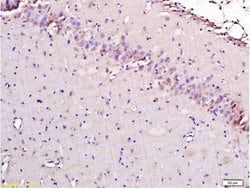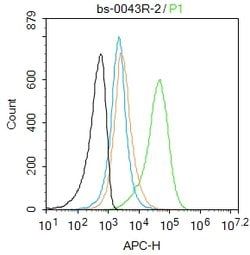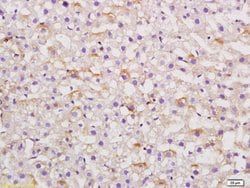AIF Rabbit anti-Human, Polyclonal, Bioss
Manufacturer: Bioss
Select a Size
| Pack Size | SKU | Availability | Price |
|---|---|---|---|
| Each of 1 | 50-198-0013-Each-of-1 | In Stock | ₹ 38,381.25 |
50-198-0013 - Each of 1
In Stock
Quantity
1
Base Price: ₹ 38,381.25
GST (18%): ₹ 6,908.625
Total Price: ₹ 45,289.875
Antigen
AIF
Classification
Polyclonal
Conjugate
Unconjugated
Gene
AIFM1
Gene Alias
AG1; AGR1; Aif; Aifm1; AIFsh2; apoptosis inducing factor, mitochondria associated 1; Apoptosis-inducing factor 1, mitochondrial; apoptosis-inducing factor, mitochondrion-associated 1; apoptosis-inducing factor, mitochondrion-associated, 1; CMT2D; CMTX4; COWCK; COXPD6; DFNX5; ER protein 18; ER protein 19; ERP18; ERP19; hAG-1; harlequin; Hq; hTLP19; MGC111425; NADMR; NAMSD; Pdcd8; PDIA16; programmed cell death 8 (apoptosis-inducing factor); Programmed cell death protein 8; RP3-438D16.2; striatal apoptosis-inducing factor; testicular secretory protein Li 4; TLP19; UNQ713/PRO1376
Host Species
Rabbit
Purification Method
Protein A
Regulatory Status
RUO
Gene ID (Entrez)
9131
Content And Storage
-20°C
Form
Liquid
Applications
Immunofluorescence, Immunohistochemistry (Paraffin), Western Blot
Concentration
1 μg/mL
Formulation
PBS with 1% BSA, 50% glycerol and 0.09% sodium azide; pH
Gene Accession No.
O95831
Gene Symbols
AIFM1
Immunogen
KLH conjugated synthetic peptide derived from human AIF.
Quantity
100 μL
Primary or Secondary
Primary
Target Species
Human
Product Type
Antibody
Isotype
IgG
Description
- Apoptosis Inducing Factor (AIF) causes chromatin condensation and DNA fragmentation
- AIF was recently identified, and cloned
- Apoptosis is characterized by several morphological nuclear changes including chromatin condensation and nuclear fragmentation
- These changes are triggered by the activation of members of caspase family, caspase activated DNase, and several novel proteins
- Like the critical molecules, cytochrome c and caspase-9, in apoptosis, AIF localizes in mitochondria
- AIF translocates to the nucleus when apoptosis is induced and induces mitochondria to release the apoptogenic proteins cytochrome c and caspase-9
- AIF induces chromatin condensation and large scale DNA fragmentation, which are the hallmarks of apoptosis, of the isolated nucleus and the nucleus in live cells by microinjection and apoptosis stimuli
- AIF is highly conserved between human and mouse and widely expressed
- Mutations in the AIF gene cause combined oxidative phosphorylation deficiency 6, which results in a severe mitochondrial encephalomyopathy
- Alternative splicing results in multiple transcript variants of AIF and a related pseudogene has been identified on chromosome 10.



